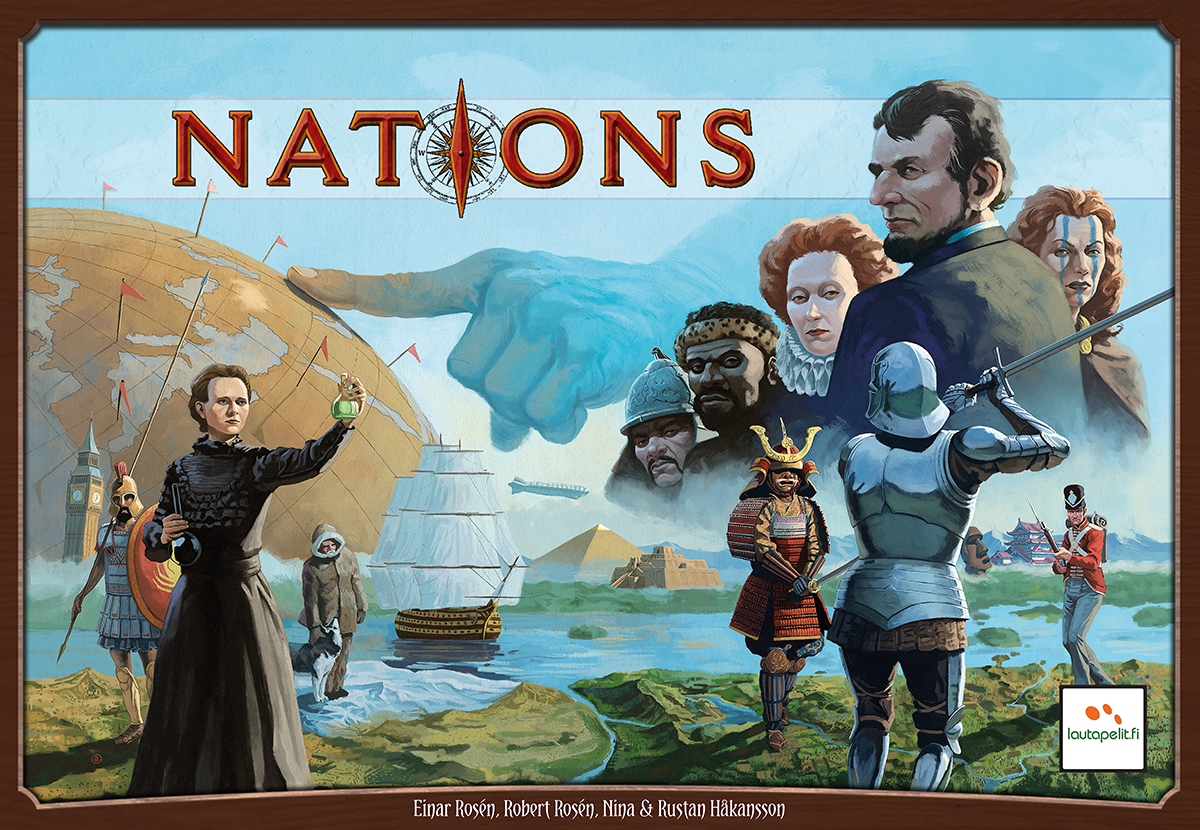Nations
- Type: Worker placement
- Players: 2-5
- Time: 2-4 hours
Nations is a classic worker placement/ building game. Players have a player board where they have actions they can place their workers on and resources/points are accumulated during play. Overall a good and interesting game if a bit on the long side.
Contents
The production quality is decent if not amazing. The score board and purchase board are solid cardboard but the player boards are more flimsy card stock for no real reason. The pieces and cards are standard with lots of variety and decent if slightly inconsistent art (A navy battle between England and Spain features a burning Inca temple…). One nice touch was numbered cards so each player knows their turn order (as it changes) with a flipped side saying ‘passed’. This was useful for knowing when someone passed but I struggled to remember the order and think an additional current player token would have helped.
The game resolves between the purchase board and the player board with the score board section slightly less important.
Play
Play revolves around the players board and the purchasing board. The score board keeps track of players culture, military and stability.
Each turn players start by choosing either some bonus resources or an extra worker. Then they take turns doing an action, actions are very simple either buying a card from the purchase board or placing one of their meeples in one of their buildings. Play very quickly moves through each player doing these small actions until everyone is finished. At the end of each round there is resource gathering and some event resolution which gives some players benefits and some punishments.
The cards being bought are the core of the game, some cards provide instance resources, some you place on your player board, often replacing something already there.
War is an interesting mechanic, the player starts the war by purchasing a war card and by doing so sets the war marker to their current military strength. All players need to have at least this much strength at the end of the round or be punished. So a weak player can start a war first to prevent strong military player playing it. Strength is usually achieved by having workers on military buildings, with it moving as workers are added and removed. This mechanic allowes player to force interaction but also doesn’t make war too strong a mechanic.
The way your workers act is also interesting, buildings only produce resources at the end of the turn for each worker on them. So placing a work doesn’t do anything straight away and instead costs you resources to place them! The reward only comes later assuming that worker didn’t have to be moved off if you suddenly needed them elsewhere. The exception to this are military and stability which do take affect straight away but do not accumulate each turn so moving off it affects you immediately too. This means that the worker placement aspect of the game feels slightly delayed which is interesting and challenging.
Players can purchase and then build Wonders, which is the only way to add more buildings to the player board, mechanically they are like a building with a permanent worker.
Play lasts for 8 rounds. Each round players are looking to gather resources (ore, food & knowledge) and put themselves in position to take advantage of the new cards that arrive each turn. They also seek the reward from each rounds event, while trying to avoid the punishment from war, the event and other debts they may have to pay that turn. At the end each player scores points for the resources they have, individual victory points they have and points from building they have people on.
The player board does not really grow during play, instead spaces are upgraded.
Thoughts
I found Nations a very interesting and intense game. You make small choices each turn and I liked that your player board doesn’t grow with choices but instead stays small. This means the game does not become more complex as play evolves but instead it is about how you managed the growth, since moving to the new buildings will cost you resources to move your workers and the building rarely pay themselves back in one round.
Resources are also much simpler then most games, ore is used to place workers, money to buy from the store and food to feed people. Nothings requires more than one type of resources so there is no getting frustrated because you don’t have the right combination of goods.
At first I thought war was too much the focus but I think that it is well balanced. Players absolutely need to invest in it, but having more military does not enable a player to directly attack or hinder another player, so you can under invest one turn without risking your existence! like buying new buildings the game is about balancing choices.
Scoring is a little generic, with small points picked up here and there, there is no real knock out victory point generator. That helps make the game tense, as the loss of a point here or there is keenly felt.
Overall I enjoyed it and look forward to playing again. The card deck is very large so each play I’m sure will be different.
First Impression
Was long but would definitely be keen to play again. There were a lot of interesting interactions and nothing felt like it got too unwieldly which is key in a long game. I won though so that always colours my view…


